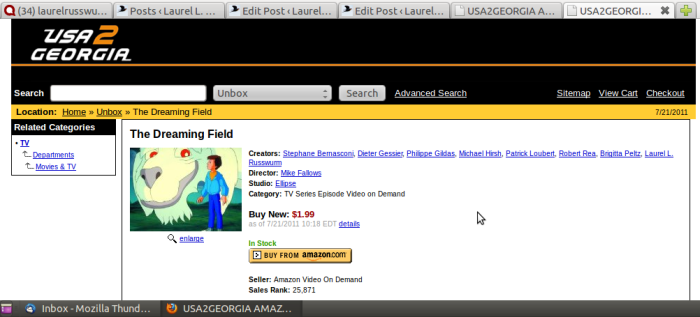Canadian copyright law prevents me from posting examples of my ‘published’ work, that is to say, produced television episodes that I wrote, on my own web page on the Internet.
Because I don’t control the copyright.
The same holds true for all the other creative professionals whose creative input went into the work, because a corporate entity holds the rights to all of our combined creativity. As near as I can tell, the corporation owns these rights by virtue of picking up the tab.
Just as the actors or even the director wouldn’t be able to post their demo reel online without first securing the permission of the corporation that owns the rights to their work. Maybe if you are a really really big star.

circa 1980's
But I understood that going in; it was the price that had to be paid if you wanted your work to be produced. When I was young I was willing to pay that price.
Of course, back then, that was the only way open to creators. Massive amounts of capital were required just to make a film or television episode. Copying was very expensive. There was no Internet to make international distribution possible, not to mention inexpensive.
So the film and television companies had absolute control. That’s why there are director’s cuts. The “studio” gets to decide what version of the movie will be released. The director might be putting his/her blood/sweat/tears on the line, but the studio is putting its money on the line. That’s why they call it the movie business.
Money trumps art.
The decisions made by a movie studio or production house aren’t made by creatives, but by money men and marketers. For a feature film, most often the director puts the film together they way s/he thinks best. Then the studio looks at it and decides if that is what will be released or if it needs to be re-cut. You know, when the project is risky – if the movie doesn’t follow an established formula. Anything innovative is always a gamble. Original is not good business.
Creativity is human; corporations are non-creative. Yet it is the corporation that has total control over the creative elements of film making. The studio releases the safest and least innovative movie possible because in that way they hope to attract the widest audience possible. The studio only wants art that will put bodies in theater seats. Ironically, in the same way they sell copies of movies in multiple formats to maximize profits, it is now common to release the “director’s cut” on DVD so they can sell more copies of the same movie.
That good movies still manage to get made is sometimes happy accident but I think more often it is due to the dedication of creatives who fight and strategize their way through the system. Even so, fewer and fewer original movies are coming out of Hollywood. The great original movies I’ve seen over the last few years have been mostly made as independents and only then released under the studio imprint – and distribution. Original is always a gamble; if you make movies from successful novels or comic book series it will attract a guaranteed audience.
This is part of why I think that corporations should not be able to hold copyright. Corporations don’t create art, creative people do. And corporations have been using copyright laws to take control of human culture.
how copyright law has hurt me
My career began in the media industry. I worked on a variety of projects and got a variety of credits. And there is nothing like seeing the projects you have worked on, in any capacity. Where possible I have video tape copies of some of the projects I worked on. Some were given to me by the production company. Others I’ve gone out and purchased. And there are some projects that I worked on that I have never seen. It is sad that I’ve never seen the “Hall and Oates and the Nylons” TV special that I worked on as an assistant video editor.
But it is tragic that I have never even been able to view ‘The Dreaming Field’ episode that I wrote for Nelvana‘s animated ‘The NeverEnding Story‘ series. As was my custom, I requested a copy at the time, but I was told by the head story editor it was against corporate policy, and that even he didn’t have cassettes of episodes he’d written.
In the years since writing the script, I’ve only ever found one commercial Neverending Story VHS tape from the series in Canada. And it didn’t include my episode. But the world has changed. The cost of the technology has dropped, and it is no longer prohibitively expensive to make copies. In recent years, the Neverending Story series has been made available online as Amazon downloads. Yay!
Except copyright prevents me from paying $1.99 and downloading a copy of ‘The Dreaming Field‘for myself, because:
Video Playback Not Authorized”
“We have detected that you are not located within the U.S. Due to licensing restrictions, Amazon Instant Video Customers must be located in the United States when viewing videos online.”
—Amazon.com: Neverending Story: Season 2, episode 19, “The Dreaming Field”: Amazon Instant Video
“Licensing restrictions” are part of copyright law. They call this “copyright protection,” but I really don’t see how this protects me as a creator. Sure, I was paid for the work. Over the years I’ve received sporadic tiny incremental sums. “Royalties.” A much greater percentage of the royalty is paid off the top to the copyright collective that administers these funds, supposedly “on my behalf”.
The argument that is always made in support of increasingly restrictive copyright law is that copyright protects creators. I don’t believe that.
I wrote “The Dreaming Field” script more than 15 years ago. Back when copyright terms ran for a mere fourteen years, it would be in the public domain by now. Nowadays copyright terms run for decades after the death of the author. That helps me how?
In today’s world, I still have never had the chance to even see the film made from my script. Thanks to copyright.
That hurts me.




[…] Laurel L. Russwurm: Copyright and Me […]
[…] Copyright and Me […]
[…] afraid that copyright law harms creators rather than helping, particularly in Canada, which has some of the strongest copyright law in the […]
[…] Copyright and Me Canadian copyright law prevents me from posting examples of my ‘published’ work, that is to say, produced television episodes that I wrote, on my own web page on the Internet. […]
Copyright is about corporate control of media and content. Not protecting the artists.
Yes, you are correct, that is the reality.
The problem is that the corporations controlling the media and content, with their vast resources (largely procured off the backs of creators) pretend that copyright exists to protect the artists.
The word is starting to get out, but still the bulk of artists and society believe this false justification. The only way to counter the longstanding deeply entrenched propaganda spread by these corporate interests is by countering it with the truth.
The rightful owner of the right to copy is the individual. It must be recognised that the 18th century privilege of copyright annuls the right to copy in the majority to leave it, by exclusion, in the hands of a few (copyright holders). Being a privilege thus held (as opposed to a right), it can be transferred.
Before artists get all indignant that they should be unable to be tempted to transfer their privilege to corporations in exchange for peanut royalties, I suggest individuals get all indignant that their right to copy shouldn’t have been alienated from them in the first place.
In other words, abolish copyright. Restore everyone’s cultural liberty – restore our right to share and build upon our own culture – all published works.
If you’re an artist and you don’t want the public to share or build upon your work, the solution is obvious. Don’t publish it.
Ah, yes. Another radical. You should drop by the Balanced Copyright Group on Facebook and help give the Canadian Recording Industry Association folks ulcers.
Wayne
I agree that the right to copy shouldn’t have been alienated from creators in the first place, but I wasn’t around to block the Statute of Anne. There is still far too little awareness outside the tiny part of the world’s populations who are aware of any of this. As I’ve been learning about copyright law, and how it has come to be positively ruinous, not just to creators, but to our very culture, I’ve been doing what I can to raise awareness.
You can’t always link to the article. Although traditional newspaper are increasingly online, their content seems to gets taken down far sooner than anything else online.
I’ve since learned that Bill Bennett isn’t alone.
Here in Canada there is the sad case of Jesse Brown, the intrepid TVO Search Engine podcaster. Formerly with CBC, Jesse moved to TVO where he was allowed to CC everything (as he does). But all the work he did at CBC is locked under CBC copyright, and the worst of it is that it is not even online and linkable.
As to copyright, I’ve long argued that it should not be transferable. Did you see my recent article covering the problems that a programmer had when the company he was working for was sold? Rather nasty mess.
Wayne
No I hadn’t until now (and I should be sleeping, but I read it anyway). I agree transferring right is one off the worst things about copyright. Particularly to corporations, which are incapable of creation.
As a journalist I face similar problems with news stories and features I’ve written.
My problem comes when I want to recycle quotes or other information from earlier stories.
I’ve always wondered if I could end up in court accused of plagiarising my own copy. It would certainly make for an interesting case.
That’s an interesting wrinkle. I don’t think it would be plagiarising, because you are the author, but more likely copyright infringement if you are not also the copyright holder.
If we have copyright, the only people who ought to be allowed to hold copyright ought to be the author or creator.
You can of course link to the article, but that isn’t the same as posting it.
Wayne